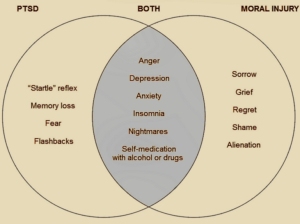I have been involved in discussions about combat stress for a good number of years now. Even if you don’t count my combat deployment in 2004, I was being treated for Posttraumatic Stress Disorder since my discharge in 2006, and was eventually diagnosed in 2008. As a student veteran at Hawaii Pacific University, I read Brett Litz’s journal article on “moral injury” and my participation in the 2010 Truth Commission on Conscience in War included my being both a testifier and a commissioner. Of course, that was after I returned as a civilian to my former field of battle (Iraq), but before I wrote two books on my experience wrestling with who and what I was as someone touched so personally by war.
I then listened, read, and watched a lot of podcasts, articles, and documentaries about this new “moral injury” thing captivating the attention of the VA. Of particular importance was the Huffington Post series on moral injury, but it was by no means the only or most important things I encountered. I liked it because they had some great pictures, some videos, and they seemed to acknowledge the complexity of the issue of combat stress and its manifestation as moral injury.
However, I noticed something odd about those and the vast majority of other public discourses about moral injury especially. I wrote a Masters thesis about it, in fact. One important aspect of any injury is the body upon which it is inflicted, which I have not heard very much deliberation about. How can we treat an injury if we don’t have a solid comprehension of the body itself? It’s like having the ambulance crew staffed by first year medical students…
This impacts me tremendously and is inseparable to my identity as both a veteran and a student. As a veteran, a lot of people are talking about how I should be treated, and how something my body, mind, or soul, etc. should be diagnosed. As a student, I am very concerned about intellectual accountability, and I worry those who are doing the diagnosing don’t have the training necessary to adequately assess the thing which they are observing. For these reasons, we all must ask why those who are talking about moral injury often have no training in moral philosophy or theology. In many of the discussions about moral injury, mental health professionals are considered expert, but that relegates this injury to a problem primarily of mind or body, which is thought to be more or less something to which only I have access. But morals (and any injury against them) are derived in community, they are about right and wrong, which vary between cultures and families.
Having psychologists as the primary commentators on moral issues is not just a confusion of the functions and categories of the academic and medical disciplines involved, but it also neglects the centrality of bodies’ dependence upon communities (i.e. how does “moral injury” name the damage done as being caused and felt by entire groups?).
We need to leverage a more diverse set of faculties and disciplines to this concern. Moral injury, as one of innumerable constructs through which the modern world has made sense of combat stress, needs to be reflected on by professionals other than those in the mental health and medical fields. Though each are necessary and important elements in these discussions, they must not be the only fields thought to be expert therein. In fact, insofar as morals are about meaning and ethics, theologians have especially rich resources from which to speak. As religion plays a central role in informing our self-identity, we need to take seriously that Biblical scholars, philosophers, and theologians have just as much to say about moral injury and combat stress as other disciplines.
**update: edited 20140218.1830 for clarity.

Reblogged this on I Ain't Marchin' Anymore and commented:
From the guy who wrote the book on moral injury, an invitation ….